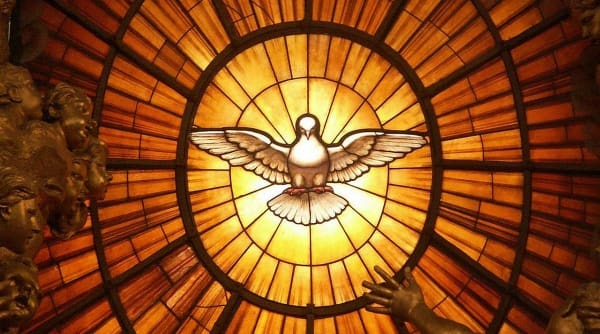Editor’s note: Today David Torkington’s Mini-course on prayer continues part three, on Contemplation. To read the first of this series please see part 21 here.
It is only in mystical contemplation that our weak human love is so purified that it enables this love to mix, mingle and merge with the love of the Holy Spirit. Then, suffused and surcharged with this love we will not only be able to enter into the mystical body of Christ but into Christ’s mystical contemplation of our common Father. This contemplation which is hardly perceptible to begin with will eventually lead to and beyond ecstatic bliss in our minds and hearts even in this life, before overflowing into our whole being, transforming it as Christ’s own body was seen transfigured and transformed on Mount Tabor.
Where Have all the Mystics Gone?
It is in the purification that must precede the experience of God’s love in mystical contemplation, that the great saints, prophets, and reformers are gradually transformed into the image and likeness of Christ. They were there in abundance in early Christianity and before, during, and after great reforming councils like The Fourth Lateran Council and the Council of Trent. However, for the reasons that I will explain later, they were noticeable by their absence before, during and after the Second Vatican Council. I will explain why, and how, because it is due to this terrible tragedy that the Church is fighting for its life at the beginning of the twenty-first century. I will begin by outlining the very essence of this God-given mystical spirituality that animated and inspired the early Christian Church. Then I will follow this with a brief history of Christian mystical spirituality.
‘Mysticism’, is a word never used by the early Christians, nor by any of the Greek Fathers. In general, it is used today by many disparate groups from modern-day Neo-Platonists to myriad different forms of New Age enthusiasts. Most of them are bounty hunters seeking exotic or esoteric transcendental experiences of one sort or another for their own personal pleasure, wellbeing or satisfaction tending to be anthropocentric rather than theocentric.
In human loving, the transforming experience of being loved is the consequence or byproduct of selflessly giving oneself to another. The same is true of divine loving when our weak human loving is united to the divine loving of Christ, enabling us to contemplate God and to experience what St Paul calls “the love that surpasses all understanding.” If you seek this love purely for your own pleasure and satisfaction it will continually elude you. But if you persevere in seeking it, or rather, God, for his own sake, with endless self-effacing perseverance, ‘come hell or high water’ then you will inevitably receive him and his love until it overflows into every part of you, and from you onto others.
God’s Secret Plan -The Mysterion
The ancient Greeks had various religious cults that privileged citizens belonged to. The rites of initiation were so secret that severe penalties were imposed on anyone who divulged them. A great and well-loved Athenian General called Alcibiades was exiled from Athens for mimicking them when he and his friends had too much to drink. Because these initiation rites were so confidential they were called the ‘mysteries’ from the Greek word meaning secret or hidden. It was for this reason that St Paul coined the word Mysterion to describe ‘God’s Secret Plan’. This plan was to create us so that we could come to know and experience the ecstatic joy of sharing in the life and love of the Three in One, and to experience it with ever growing intensity to all eternity. He called it ‘God’s Secret Plan’ because it was never fully divulged in the Old Testament, although it was hinted that God had something special prepared for his people in the future (Ephesians 3:9-11). Even when Jesus came to prepare people for the final unfolding of God’s Plan, he did not reveal it fully. It was only after he sent the Holy Spirit that this plan was seen with ever greater clarity, as Jesus promised at the Last Supper (John 14:25-27). The Good News that St Paul proclaimed then, was that thanks to the Holy Spirit sent on the first Pentecost Day, ‘God’s Secret Plan’ was a secret no longer for those with ears to hear and hearts to love with. If they were baptized they would be taken up into God’s Secret plan that was now no longer simply an idea, but a person, the risen and glorified Jesus Christ, the Lord. It would be in, with and through him that we would journey on to the place that God his Father has prepared for us, bringing his plan to completion.
Christ – The Way, The Truth and The Life
Those who were baptized and had totally dedicated their whole lives to entering into God’s plan in the Risen Christ were called mystics. However, it was only if those who chose to enter into Christ’s mystical body further chose to enter into his sacred action, into his contemplation of the Father, that they became mystics in the sense that we use the word today. They would then be on the mystic way, in, with and through Christ, the Way, the Truth, and the Life. It is from the word Mysterion then that the words ‘mystic’ and ‘mystical’ have their origin, as also the word the ‘mysteries’, because they lead us into, and sustain us, as we participate in ‘God’s Secret Plan’ that he designed to bring us to perfection in the Risen Christ. When Latin took over from Greek as the official language of the Church, the ‘mysteries’ came to be called the ‘sacraments’. In earlier years, however, the sacred reading of the scriptures was also seen as one of the mysteries for the first Christians, enabling them to come to know and love Christ in such a way that they were led on to generate the love that leads to union with Christ in his contemplation of the Father. It was for this same reason that many centuries later, another popular way of generating the love that leads to union came to be called the ‘Mysteries of the Rosary.’
Early Christian spirituality was designed by God himself from the beginning, who then sent his Son, Jesus Christ to bring about on earth what was originally conceived in heaven. Having spent his time before the Resurrection explaining God’s plan and how it was about to be put into operation, he instituted a profound mystical spirituality that would enable his followers to participate in God’s plan to eternity. This spirituality would help and support believers in their endeavor to enter into his now glorified mystical body, to be united with him in his contemplation of the Father. The more we are purified from the self-love that prevents us from entering ever more fully into this mystical contemplation, then the more we will come to know and experience his infinite loving. But union with Christ can only be realized to the measure that inner purification has prepared us to receive it. Then, the love that we receive can be shared with the world around us, beginning with our own family, and our spiritual brothers and sisters in the Christian community.
The Meaning of Mystical Theology
This enables us to understand precisely what Mystical theology teaches. It teaches how the love of a sincere Christian searcher is gradually prepared for an ever deeper union with Christ. It teaches how this union is brought about through a profound inner transformation that purifies, refines and brings our love to perfection, enabling us to become one with Christ, not just in being but in action, in his mystical contemplation of the Father. At last, what we thought we knew by faith alone becomes palpable, as in, with and through Christ we are able to experience tangibly the love that created us in the beginning and the love that will be our ultimate destination. It is this ever deepening and ever-expanding experience of being loved that makes all the difference in the world. Knowledge alone is not enough. Knowledge alone will never change anyone permanently for the better. But the experience of being loved will. All this happens in the mystic way where saints are made out of sinners and where the great spiritual leaders are formed to lead us back to the contemplation that dispels darkness and bathes us in the light of God’s love that makes all things new, beginning with us.
Detail of the Holy Spirit by Gian Lorenzo Bernini, in the apse of St. Peter’s Basilica, Wikimedia Commons.




